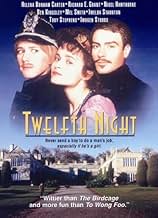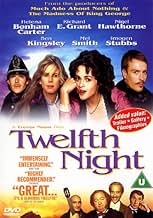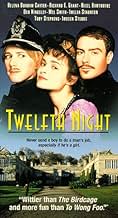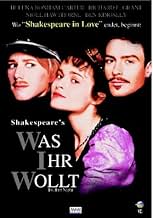IMDb RATING
7.1/10
6.6K
YOUR RATING
Shakespeare's comedy of gender confusion, in which a girl disguises herself as a man to be near the count she adores, only to be pursued by the woman he loves.Shakespeare's comedy of gender confusion, in which a girl disguises herself as a man to be near the count she adores, only to be pursued by the woman he loves.Shakespeare's comedy of gender confusion, in which a girl disguises herself as a man to be near the count she adores, only to be pursued by the woman he loves.
- Director
- Writers
- Stars
- Awards
- 1 win & 2 nominations total
Sidney Livingstone
- Captain
- (as Sid Livingstone)
David Burke
- Party Guest
- (uncredited)
- …
- Director
- Writers
- All cast & crew
- Production, box office & more at IMDbPro
Featured reviews
Slick Shakespeare adaptation, well acted and very humorous (in parts) in its telling. Naturally, there's always going to be some differences from stage to cinema. The film took advantage of this, of course, to avoid a "stage" feel. The perceptions, or rather the misperceptions, of people and motivations are well explored and portrayed. Ben Kingsley is a standout, for his interesting twist on the character Feste. In short, a good adaptation and film. Recommended.
Reading other reviews of 'Twelfth Night' it is interesting to see that some people think it is a slow film and others quite fast. It gripped me from the opening gust of rain on a dark night to Feste dancing off into the sunset. Grappling with Shakespeare is a perilous activity but I thought Trevor Nunn brought out the comedy and the emotions of the story well. It is a film to make you smile at the follies of mankind but also their charm.
Ben Kingsley is amazing. I've never seen Feste played that way but it seemed perfect. Imogen Stubbs does the comedy and the drama equally well. The scene with Orsino in the bathtub is a stock one but she does it beautifully, balancing the humour of the situation with the tenderness and the longing. Imelda Staunton brings unusual depth to the character of Maria. The rest of the cast are great too.
The text of the play is changed around but not unnaturally so. The scene that cuts between Feste's song and Viola/Cesario and Orsino playing cards is wonderful, taking in eight of the characters and telling you more about them. The last act of the play is difficult to stage well but Nunn gives it a good shot.
The Cornwall setting is lovely, the radiant sunshine, the green leaves and fine buildings are captured gorgeously by the cameras. I also liked the music very much and find some of the tunes quite hummable.
Very enjoyable and worth seeing again and again.
Ben Kingsley is amazing. I've never seen Feste played that way but it seemed perfect. Imogen Stubbs does the comedy and the drama equally well. The scene with Orsino in the bathtub is a stock one but she does it beautifully, balancing the humour of the situation with the tenderness and the longing. Imelda Staunton brings unusual depth to the character of Maria. The rest of the cast are great too.
The text of the play is changed around but not unnaturally so. The scene that cuts between Feste's song and Viola/Cesario and Orsino playing cards is wonderful, taking in eight of the characters and telling you more about them. The last act of the play is difficult to stage well but Nunn gives it a good shot.
The Cornwall setting is lovely, the radiant sunshine, the green leaves and fine buildings are captured gorgeously by the cameras. I also liked the music very much and find some of the tunes quite hummable.
Very enjoyable and worth seeing again and again.
This is, quite simply, the best production of a Shakespeare comedy ever filmed. The plot is delightfully absurd, the acting brilliant, the direction superb. It is the sort of comedy you can watch over and over again.
As with most Shakespearian comedies, the plot is deeply implausible. However, the excellent Cornish locations at St Michael's Mount & Lanhyrock give a good sense of place and the winter setting (apart from the scene of apple picking!) comes across well - it really does look like an English winter, rather than a picture postcard snow-scene.
The play is cut down to a manageable length without losing the sense of it, The broad comedy aspects (Toby Belch et al) are thankfully limited.
The acting is well done by a cast of British stalwarts. Amazingly, Viola and Sebastian actually do look broadly alike.
This film is best viewed as an amusing light romantic comedy rather than a side-splitter.
The play is cut down to a manageable length without losing the sense of it, The broad comedy aspects (Toby Belch et al) are thankfully limited.
The acting is well done by a cast of British stalwarts. Amazingly, Viola and Sebastian actually do look broadly alike.
This film is best viewed as an amusing light romantic comedy rather than a side-splitter.
At one time adaptors of Shakespeare for the cinema trended to concentrate more on his tragedies and history plays rather than his comedies. The 1990s, however, saw two very fine adaptations of Shakespearean comedies, Kenneth Branagh's "Much Ado about Nothing" and Trevor Nunn's "Twelfth Night".
"Twelfth Night" is another name for the Feast of the Epiphany, January 6th, and the action of the play is supposed to take place around that date. Nunn, however, did not shoot this film in winter but in autumn; filming actually took place in November, but the crew were mostly lucky with the weather and the look of the countryside might suggest late September or early October. Although the setting is still officially "Illyria", an old name for Croatia, Nunn effectively updates the action to Victorian England. The film was shot on location in Cornwall, with St Michael's Mount standing in for Orsino's palace and Lanhydrock for Olivia's mansion.
Unlike his contemporary Marlowe in "Edward II", Shakespeare never dealt directly with the subject of homosexuality, but "Twelfth Night" is perhaps the play in which he came closest to dealing with it by implication. The plot revolves around a curious love-triangle, A loves B, who loves C, who loves A. Orsino, Duke of Illyria, is in love with the beautiful countess Olivia. She, however, has no interest in Orsino, but has fallen for "Cesario", the handsome young man whom Orsino uses as his go-between. Unknown to both Orsino and Olivia, however, the supposed "Cesario" is really a disguised woman, Viola- who has fallen in love with her employer. An extra complication- and a possible solution to the problem- arises when Viola's identical twin brother Sebastian, whom she previously believed to be dead, arrives on the scene. (Yes, I know that in reality you cannot have identical opposite-sex twins, but Shakespearean comedies are not noted for their strict realism).
The lesbian overtones to the Olivia/Viola relationship would probably have been rather muted in Shakespeare's day when all female roles would have been played by boys, but here Helena Bonham-Carter and Imogen Stubbs (the director's wife) make the most of them. Even with the assistance of a quasi-military uniform and a false moustache, the lovely Imogen never looks particularly masculine, so there is an implication that Olivia has fallen for someone she consciously believes to be male but subconsciously knows to be female. The gay overtones to the relationship between Toby Stephens' Orsino and "Cesario", and to that between Sebastian and Antonio, the sea-captain who has befriended him, are perhaps even stronger. Certainly, Orsino's conversations with "Cesario" seem remarkably intimate if he really does believe his young companion to be male.
Along with the likes of "Much Ado " and "As You Like It", "Twelfth Night" is sometimes described as a "joyous" comedy in contradistinction to more "problematic" comedies like "Measure for Measure" and "All's Well that Ends Well". It does, however, have its darker side; several characters, for example, have recently suffered bereavement, or believe themselves to have done so, and this production tends to stress the darkness underlying the play. The autumnal setting contributes to this feeling, as does the fact that most of the characters are seen dressed in black.
The dark overtones are particularly pronounced in the sub-plot involving Olivia's steward, Malvolio. He is sometimes played simply as a narrow- minded Puritan and his adversary Sir Toby as a jovial, lovable old man whose only concern is to have his "cakes and ale". For Nunn, however, matters are not so simple. Nigel Hawthorne's Malvolio- the one character for whom there is no happy ending- is an essentially tragic figure, a dignified and dedicated servant who is tricked into making a fool of himself by a gang of people who have taken an irrational dislike to him. His name is derived from the Italian for "ill will", yet its significance here may be that Malvolio is not so much the perpetrator of malice as the victim of the malice of others.
There is an excellent performance from Mel Smith, better known as a television comedian, as Sir Toby. Smith brings out both the nastiness and the sadness which lie at the heart of his character. Sir Toby is a man of wealth and noble family (he is Olivia's uncle) who has spent his whole life in feasting, drinking and womanising and who has a fondness for cruel practical jokes; besides his tricking of Malvolio he dupes his friend Andrew Aguecheek and "Cesario" into fighting a duel. (Both acquit themselves surprisingly well, given that one is really a woman and the other an arrant coward). Yet there is also an implied sadness about Smith's characterisation; Toby knows that his life has been a wasted one, but feels that it is too late to amend.
Besides Hawthorne and Smith there are too many good contributions to single them all out individually. I must, however, mention Stubbs, who is able to suggest both a male persona and the underlying woman, and Ben Kingsley as Olivia's jester Feste, whom he plays less as a clown than as a sardonic old philosopher, an eccentric but also a man gifted with penetrating insights into human life.
"Twelfth Night" is one of Shakespeare's best-known comedies, and like all well-known Shakespeare plays it has become very familiar in the theatre. A good director, however, whether in the theatre or on screen, will always be able to find something new to say about it, and that is what Nunn has done here. He and his cast have found new insights into this great play, enabling us to see it with new eyes. An excellent production. 9/10
"Twelfth Night" is another name for the Feast of the Epiphany, January 6th, and the action of the play is supposed to take place around that date. Nunn, however, did not shoot this film in winter but in autumn; filming actually took place in November, but the crew were mostly lucky with the weather and the look of the countryside might suggest late September or early October. Although the setting is still officially "Illyria", an old name for Croatia, Nunn effectively updates the action to Victorian England. The film was shot on location in Cornwall, with St Michael's Mount standing in for Orsino's palace and Lanhydrock for Olivia's mansion.
Unlike his contemporary Marlowe in "Edward II", Shakespeare never dealt directly with the subject of homosexuality, but "Twelfth Night" is perhaps the play in which he came closest to dealing with it by implication. The plot revolves around a curious love-triangle, A loves B, who loves C, who loves A. Orsino, Duke of Illyria, is in love with the beautiful countess Olivia. She, however, has no interest in Orsino, but has fallen for "Cesario", the handsome young man whom Orsino uses as his go-between. Unknown to both Orsino and Olivia, however, the supposed "Cesario" is really a disguised woman, Viola- who has fallen in love with her employer. An extra complication- and a possible solution to the problem- arises when Viola's identical twin brother Sebastian, whom she previously believed to be dead, arrives on the scene. (Yes, I know that in reality you cannot have identical opposite-sex twins, but Shakespearean comedies are not noted for their strict realism).
The lesbian overtones to the Olivia/Viola relationship would probably have been rather muted in Shakespeare's day when all female roles would have been played by boys, but here Helena Bonham-Carter and Imogen Stubbs (the director's wife) make the most of them. Even with the assistance of a quasi-military uniform and a false moustache, the lovely Imogen never looks particularly masculine, so there is an implication that Olivia has fallen for someone she consciously believes to be male but subconsciously knows to be female. The gay overtones to the relationship between Toby Stephens' Orsino and "Cesario", and to that between Sebastian and Antonio, the sea-captain who has befriended him, are perhaps even stronger. Certainly, Orsino's conversations with "Cesario" seem remarkably intimate if he really does believe his young companion to be male.
Along with the likes of "Much Ado " and "As You Like It", "Twelfth Night" is sometimes described as a "joyous" comedy in contradistinction to more "problematic" comedies like "Measure for Measure" and "All's Well that Ends Well". It does, however, have its darker side; several characters, for example, have recently suffered bereavement, or believe themselves to have done so, and this production tends to stress the darkness underlying the play. The autumnal setting contributes to this feeling, as does the fact that most of the characters are seen dressed in black.
The dark overtones are particularly pronounced in the sub-plot involving Olivia's steward, Malvolio. He is sometimes played simply as a narrow- minded Puritan and his adversary Sir Toby as a jovial, lovable old man whose only concern is to have his "cakes and ale". For Nunn, however, matters are not so simple. Nigel Hawthorne's Malvolio- the one character for whom there is no happy ending- is an essentially tragic figure, a dignified and dedicated servant who is tricked into making a fool of himself by a gang of people who have taken an irrational dislike to him. His name is derived from the Italian for "ill will", yet its significance here may be that Malvolio is not so much the perpetrator of malice as the victim of the malice of others.
There is an excellent performance from Mel Smith, better known as a television comedian, as Sir Toby. Smith brings out both the nastiness and the sadness which lie at the heart of his character. Sir Toby is a man of wealth and noble family (he is Olivia's uncle) who has spent his whole life in feasting, drinking and womanising and who has a fondness for cruel practical jokes; besides his tricking of Malvolio he dupes his friend Andrew Aguecheek and "Cesario" into fighting a duel. (Both acquit themselves surprisingly well, given that one is really a woman and the other an arrant coward). Yet there is also an implied sadness about Smith's characterisation; Toby knows that his life has been a wasted one, but feels that it is too late to amend.
Besides Hawthorne and Smith there are too many good contributions to single them all out individually. I must, however, mention Stubbs, who is able to suggest both a male persona and the underlying woman, and Ben Kingsley as Olivia's jester Feste, whom he plays less as a clown than as a sardonic old philosopher, an eccentric but also a man gifted with penetrating insights into human life.
"Twelfth Night" is one of Shakespeare's best-known comedies, and like all well-known Shakespeare plays it has become very familiar in the theatre. A good director, however, whether in the theatre or on screen, will always be able to find something new to say about it, and that is what Nunn has done here. He and his cast have found new insights into this great play, enabling us to see it with new eyes. An excellent production. 9/10
Did you know
- TriviaIn the mid 1950s, director Joseph L. Mankiewicz tried to set up a version with Audrey Hepburn and Danny Kaye, but it failed to materialize.
- GoofsFeste's guitar playing for Cesario (Viola) and Orsino does not match up with the soundtrack.
- How long is Twelfth Night?Powered by Alexa
Details
- Release date
- Countries of origin
- Official site
- Language
- Also known as
- Twelfth Night
- Filming locations
- Lanhydrock House, Bodmin, Cornwall, England, UK(Olivia's house and garden)
- Production companies
- See more company credits at IMDbPro
Box office
- Budget
- $5,000,000 (estimated)
- Gross US & Canada
- $588,621
- Opening weekend US & Canada
- $33,451
- Oct 27, 1996
- Gross worldwide
- $588,621
Contribute to this page
Suggest an edit or add missing content





































